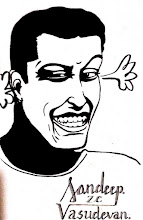This is going to be a long one, a sort of ramble. A few days ago my mate and I were talking about how people process information about other people. You know. When you meet someone new, how do you interact with them, fit them into the scheme of things, understand them enough to be able to focus a certain behavioural pattern towards them.
She thought that we only understand people in ‘chunks’ – bits and pieces of data that we collect from the other person’s choice of words, gestures, tone of voice, body language etc. And since we are dealing with discrete ‘chunks’ of data, we can never be sure how spot on our analysis of the other person is.
I agree – one can never be spot on about how one reads people. This is inherent in the way you process information about other people. You, like every human being, create a template about how to analyse another person. This template is created and constantly enhanced by your experiences. So these templates are unique to you, because all the influences upon you that shaped you will be unique. What you have experienced, the things that have shaped your life, personality, values and behaviour patterns will be different – glaringly or subtly – from everyone else. That is what makes you you, and not someone else. We always try to read patterns and understand the other in our own, personal, unique language.
So you create a format, a protocol, to run that script on, based on how you look at the world, your values and morals. This is the template within which you fit the bits and pieces – the ‘chunks’, as it were – of data you get from someone else and try make some sense of it, break it down into recognizable patterns, get an idea of the flow of that pattern. It’s like solving a jigsaw puzzle.
Yes, we generalise, because things like that fit into a pattern first. It's like looking for a word that begins with 't' in the 't' section in the dictionary. It’s a way of narrowing down the search for identity, to figure out which board this jigsaw puzzle goes on to. Is the person a man or a woman? Indian or foreign? Rich or poor? Educated or not? And so on. But that doesn't mean we stop there. Once that overall pattern is identified, then we analyse the intricacies and varieties and differences within. We then fit the more complex, subtler ‘chunks’ within that larger frame. The devil, they say, is in the details.
In your scheme of things, you are the most important person in your life. You see everyone else through your own template, and that judgement is very personally yours. And yes, it can never be spot on. But sometimes people interest you to the extent that you try to see that other person through their template, their point of view, their frame of reference. You try to understand them as they do themselves, to get an idea of who they think they are. This is called various things: empathy, compassion, friendship, bonding, love.
Mostly, and especially to the strong hearted, someone looking at you through their own frame didn’t matter much: it was their own subjective judgement on you, and that is mostly irrelevant. But when someone shows an interest in knowing you as you know you, then things change. Then suddenly it matters what the other person sees, how they think you think of yourself. You need to make them aware of the true picture you see of yourself, because as far as you’re concerned, that is the real you. And you don’t want them to get the wrong picture, or the wrong angle, or the wrong lighting, and make assessments accordingly. You want them to see how you see yourself. And that is important.
Is that sort of knowing – that intimate, in-depth understanding of another person – possible? Probably not; no one can see what you see of yourself, not completely. Your own view is something only you will know, because however much you try, someone can never get inside your head completely (unless you're in that mindbogglingly surreal movie Being John Malkovich). But there are degrees in knowing. How much do you know yourself? It’s more about what someone else knows about you, not how much. Quality over quantity. If someone else knows the things that matter, the things that make you you, then that’s a consummation devoutly to be wish’d. So yes, inasmuch as someone knowing the real you means knowing the essential stuff that makes you you, it’s possible. It’ll take a lifetime of effort though.
But more than anything else, it’s the attempt, the reaching out that really matters, isn’t it?
Subscribe to:
Post Comments (Atom)

the template building is the foundation of stereotyping...and understanding individuals in chunks or as a whole on the basis of your experience with other individuals seems unjustified to me...The complexities of our kind compel us to investigate the probabilities, possibilities and the manifestation of being with someone beforehand...its difficult to just let it be...its tough to sing "whatever will be will be". "But more than anything else, it’s the attempt, the reaching out that really matters"-- couldn't agree more...
ReplyDelete